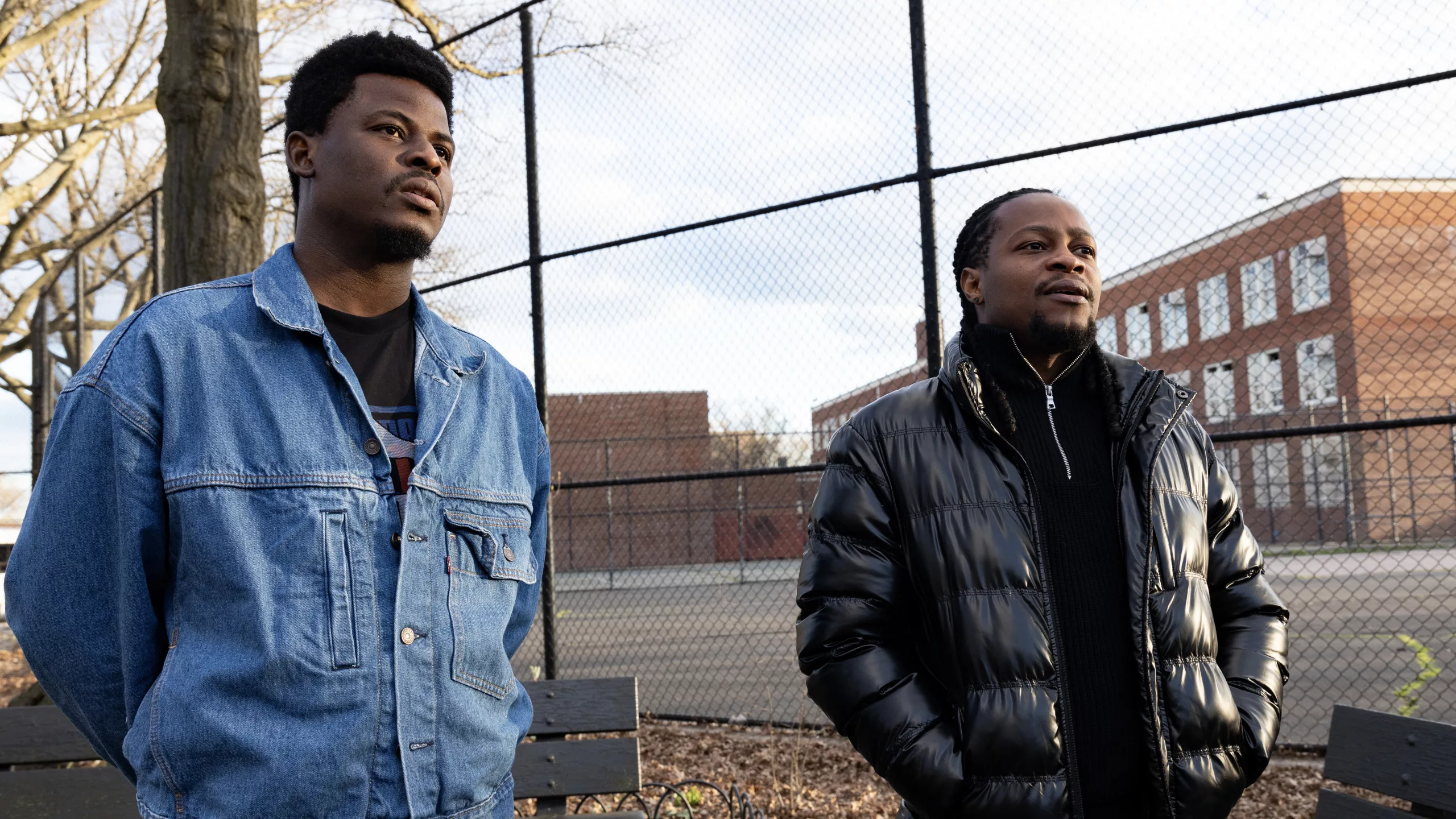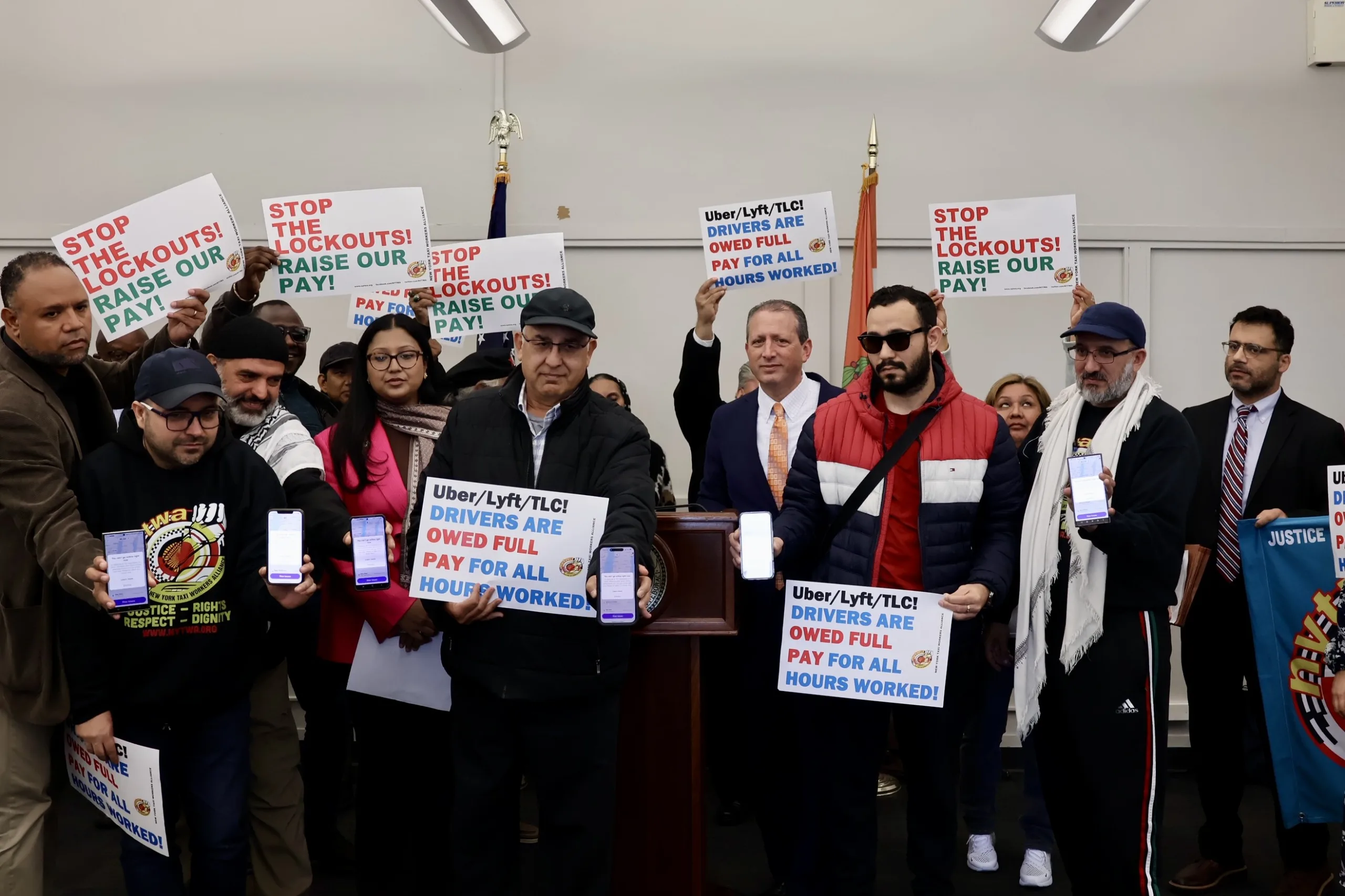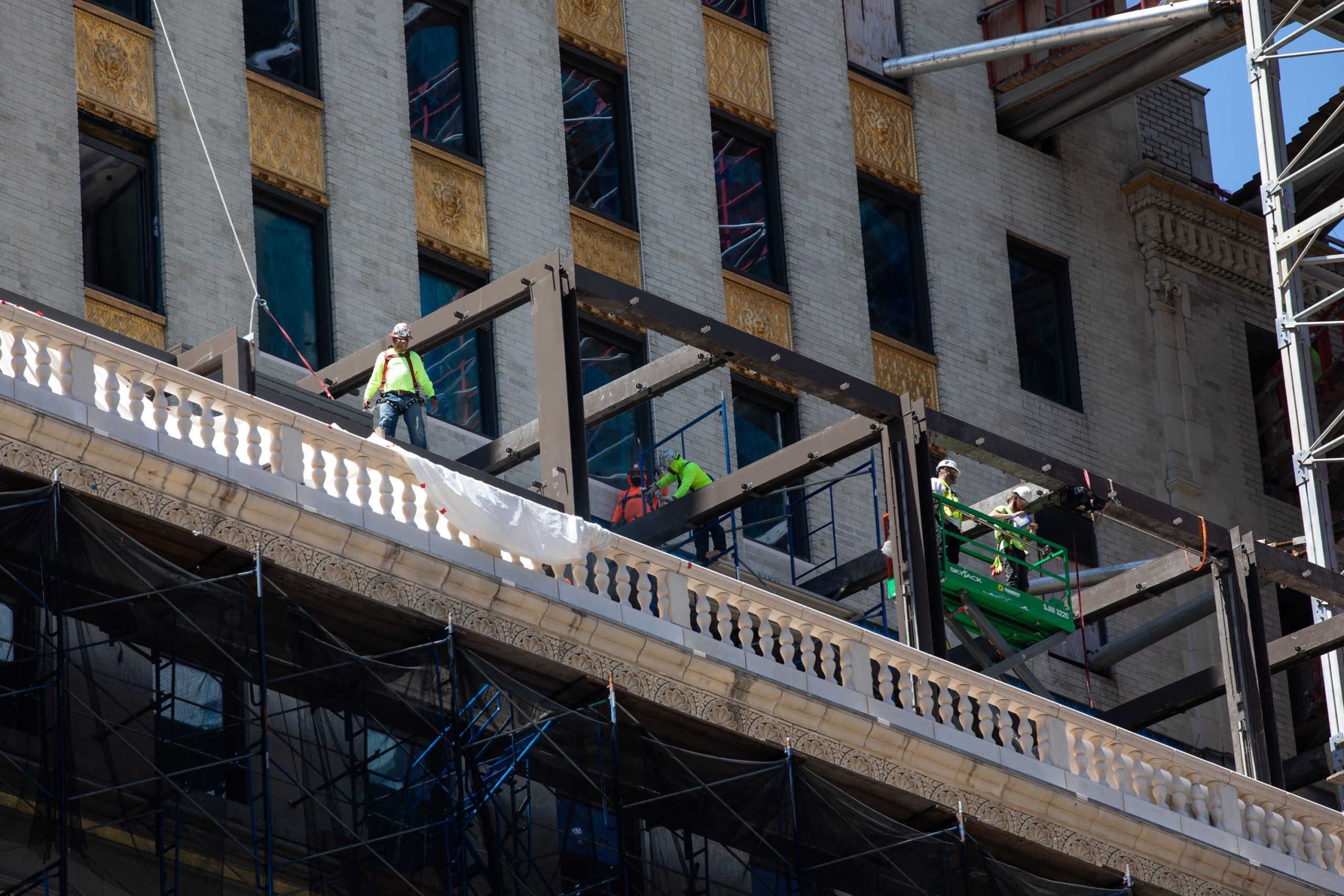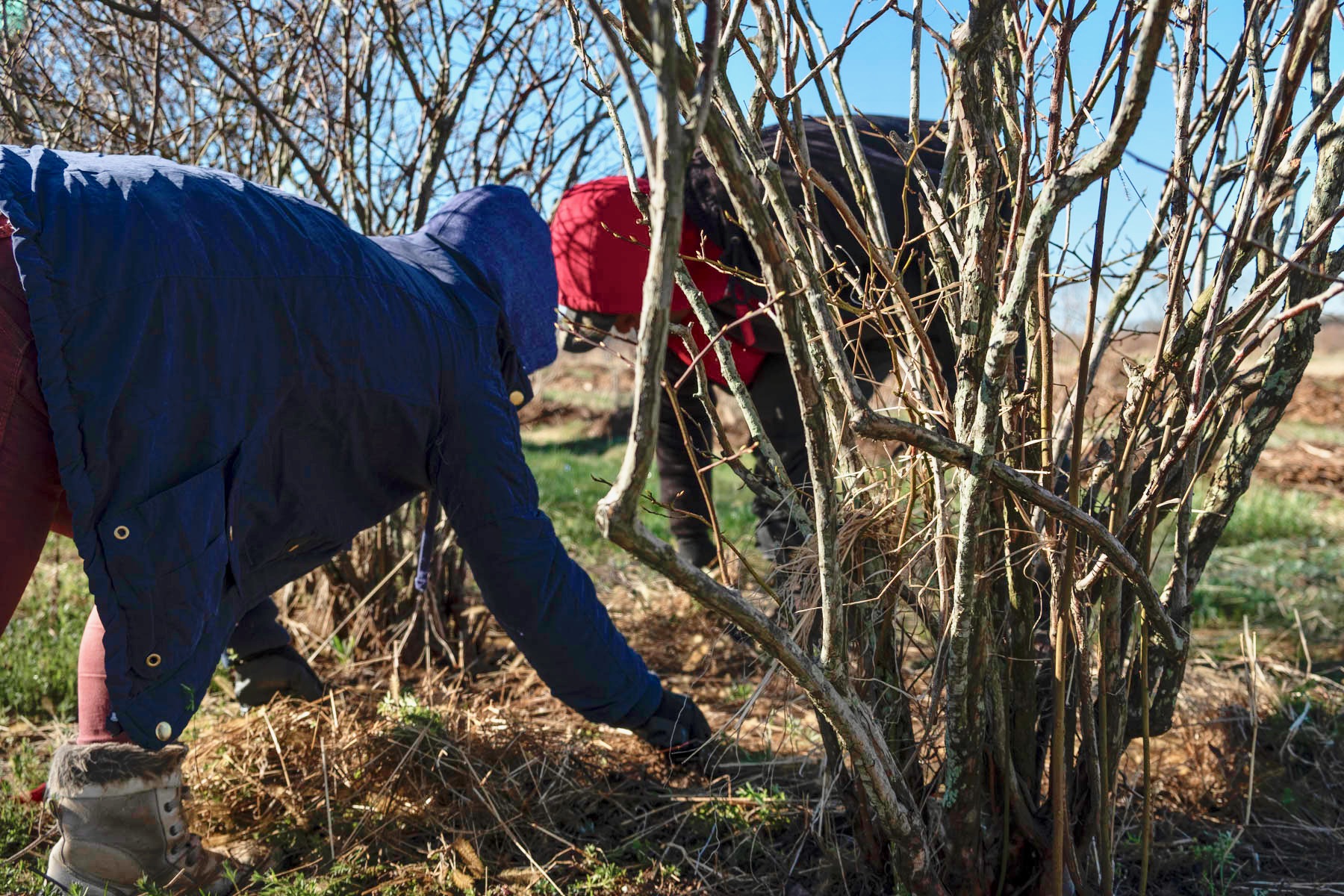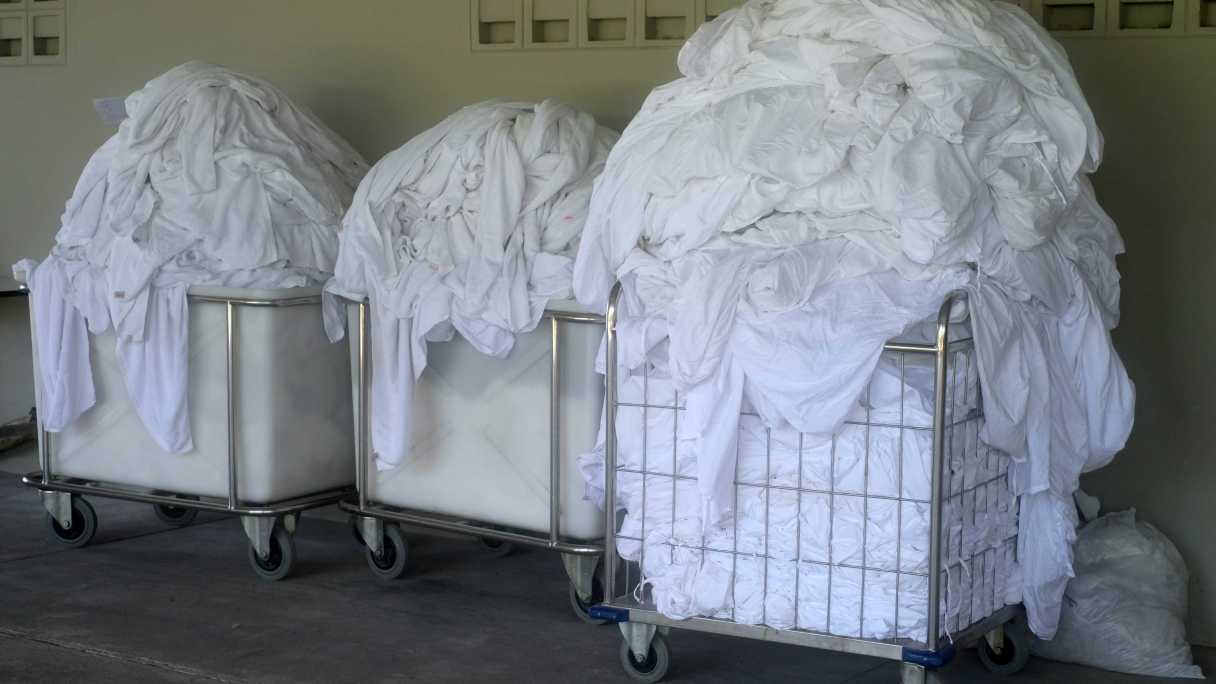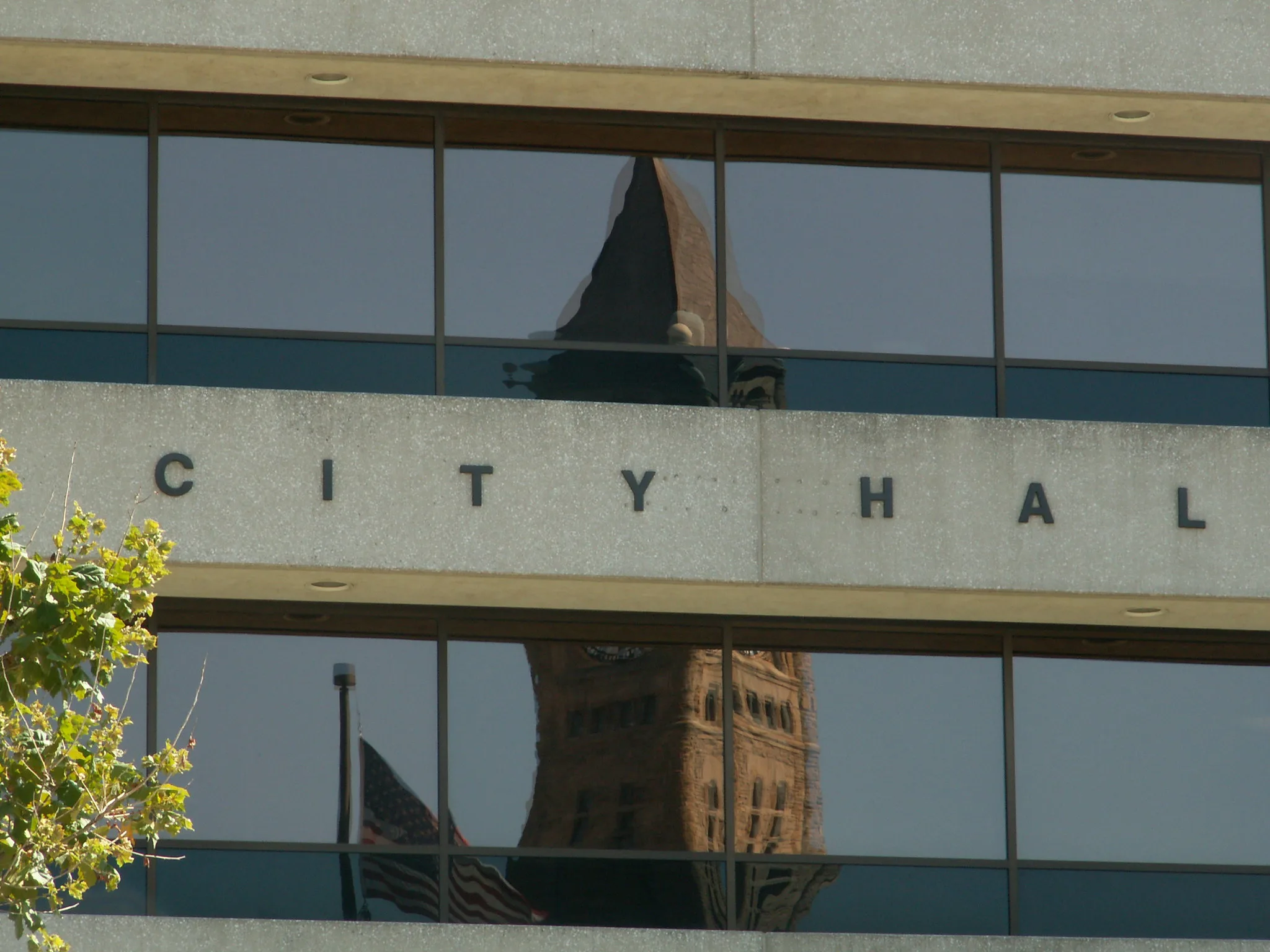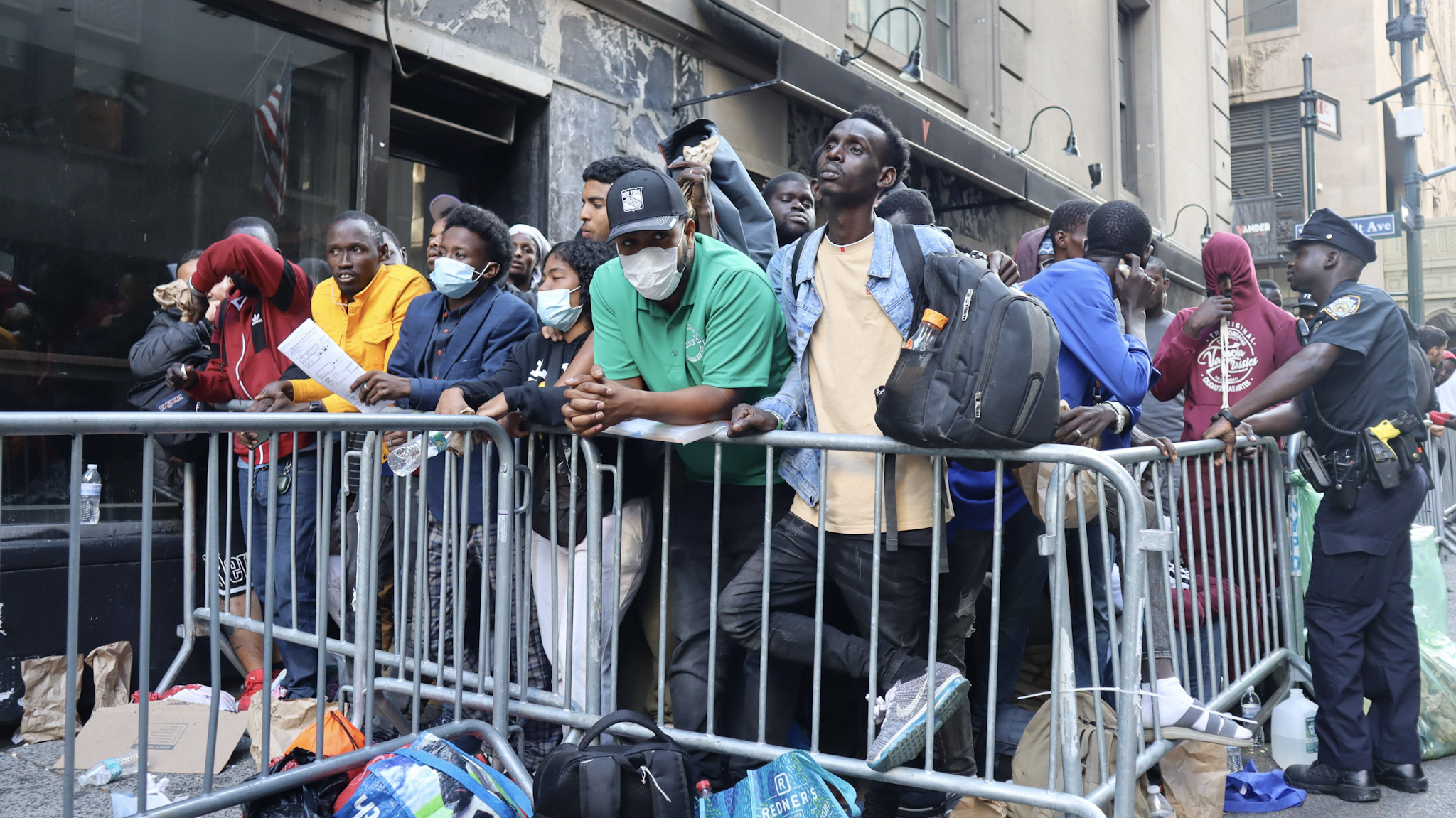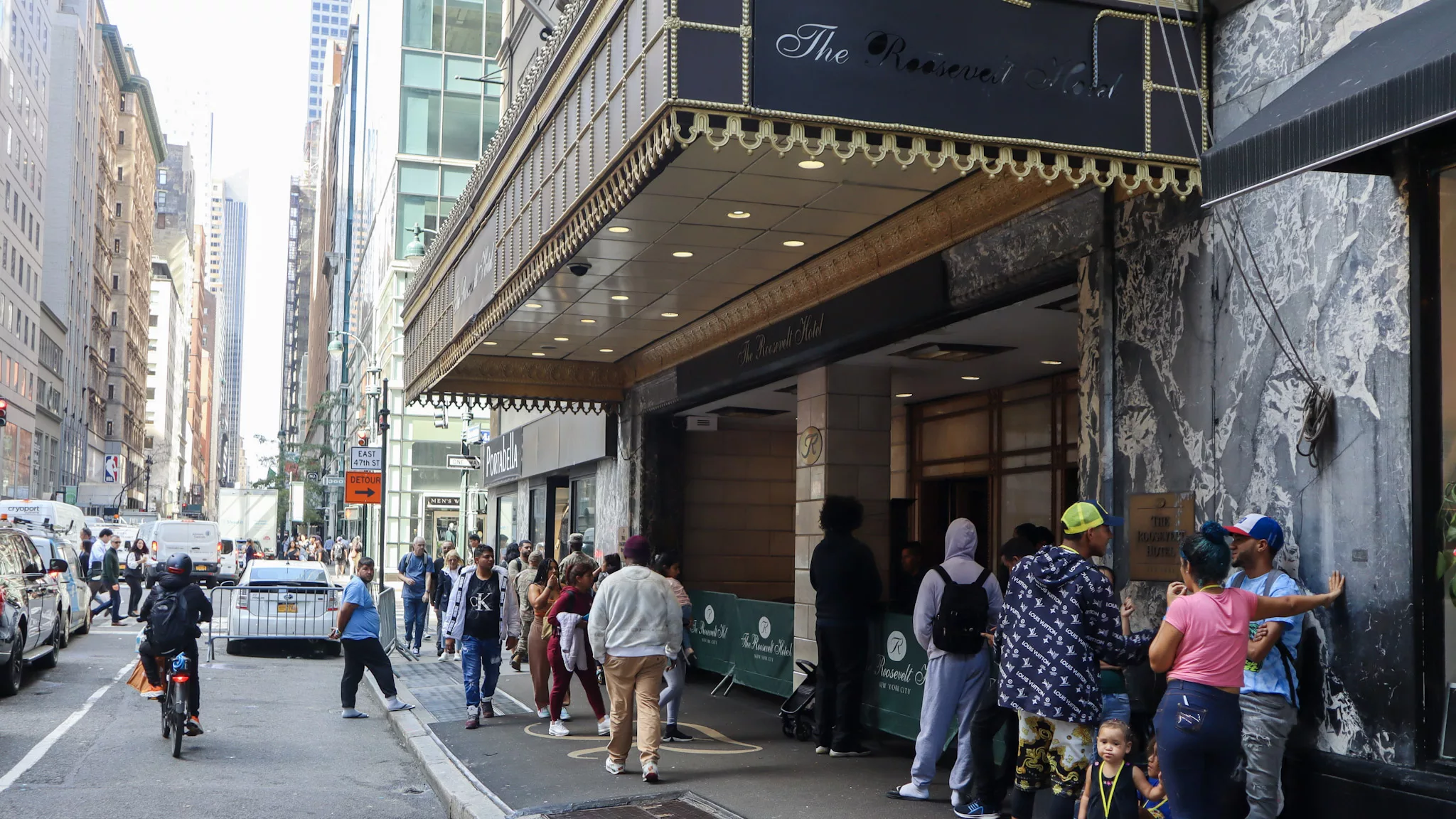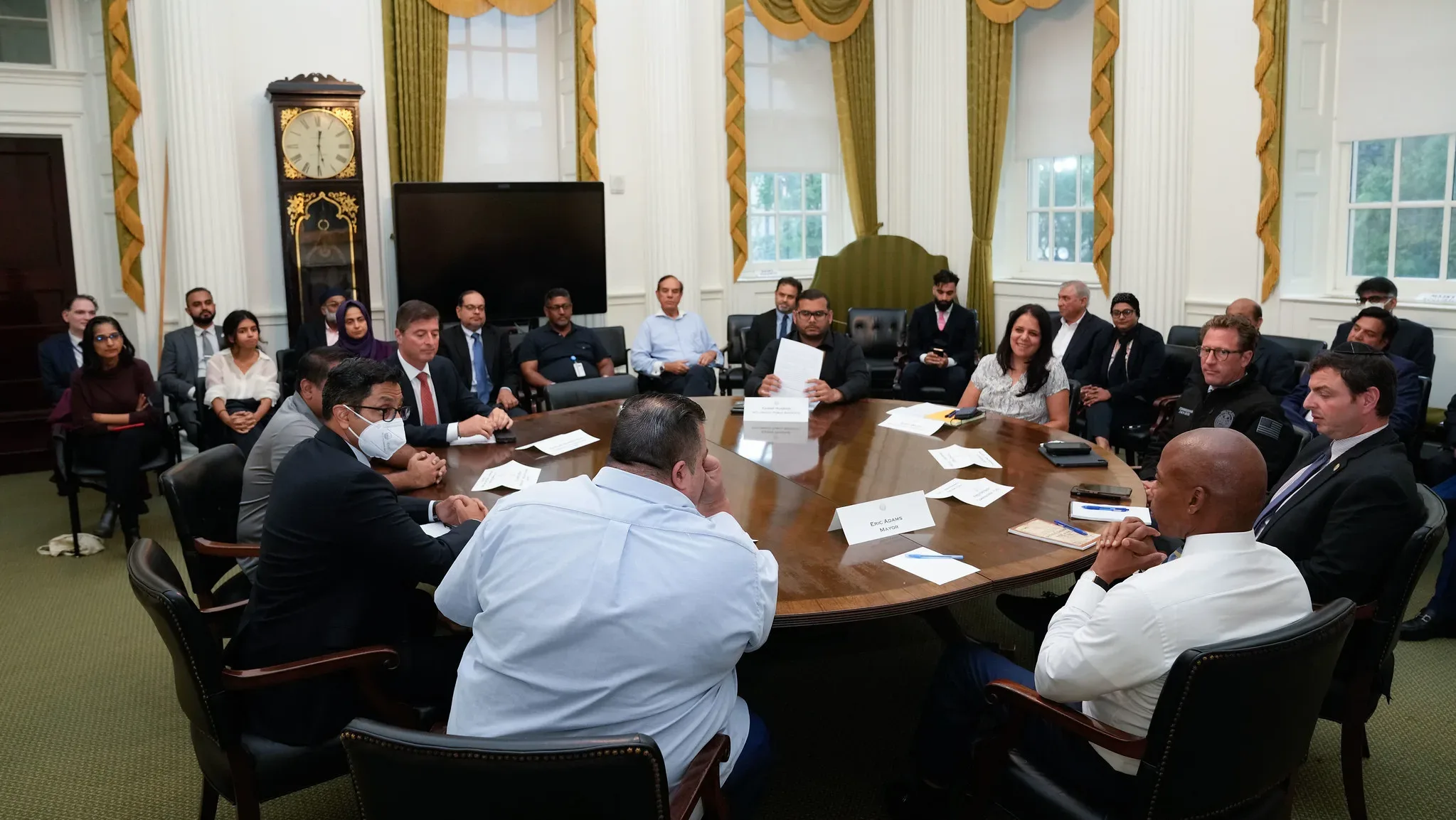When Roodolphe Nicolas met with Cosby Jean-Charles at a McDonald’s in the Flatlands neighborhood of Southeast Brooklyn, their eyes constantly scanned the room.
They were looking for danger, they said, and had developed this reflex beginning in 2017, as police officers patrolling the streets of Port-au-Prince in Haiti. Back then and now, members of Haiti’s national police force were prime targets for gang members, and seven years later, the situation has only worsened. On Tuesday, a UN sanctioned mission of Kenyan troops arrived in Haiti to battle the gangs.
Standing at a playground, Nicolas and Jean-Charles recalled sitting inside armored vehicles; hearing officers shooting at gang members, the smell of spent cartridges, the thud of bullets hitting the vehicle’s exterior.
Now their lives have taken a new direction.
Jean-Charles is a security agent at John F. Kennedy Airport. Nicolas briefly found work as a parking valet in Manhattan for one month until his work permit expired. The two men are connected to a larger group of police officers who, like them, have left Haiti to live across the United States as asylum seekers or parolees.
Among them are Miguel Chardovoine, who runs a small tree-cutting business in Buffalo, and Bernard C. Pierre, a cook at the Barclays Center, who prepares food for the Brooklyn Nets. Pierre also works as a parking valet in Manhattan and stock clerk at a Dollar General store. One by one, the men made it to New York.
In between their busy schedules, they gather to share stories and support each other.
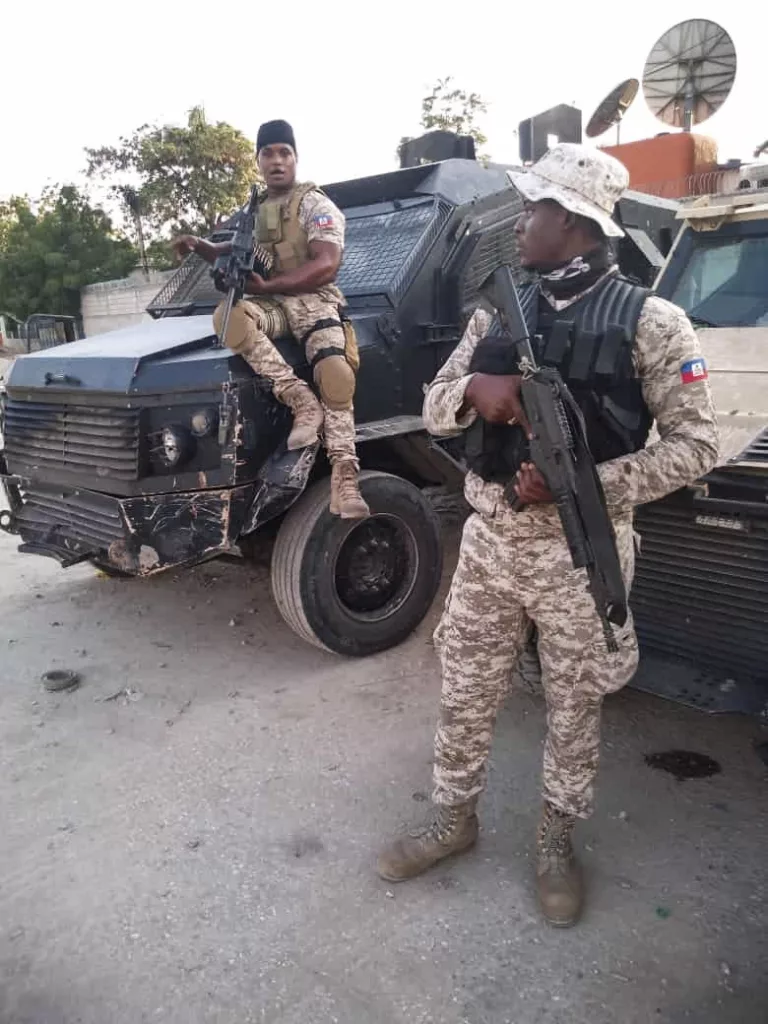
Haiti is likely one of the most dangerous countries in the world to be a police officer. But all four men fled for the U.S., not because they feared death at the hands of the gangs, but rather that their lives would be lost fighting for an institution that doesn’t care if they live or die. Nicolas, Pierre, Jean-Charles, and Chardovoine will now watch from abroad as Kenyan personnel and police officers settle in Port-au-Prince to lead a mission to quell the gang violence in Haiti. They are itching to join the fight, but instead are scraping by as many new New Yorkers do working menial jobs to pay rent.
Since the assassination of Haitian President Jovenel Moise in July 2021, the gangs have become more powerful and their violence has forced tens of thousands of Haitian citizens to leave their homeland.
Territorial disputes among the approximately 200 criminal factions in Haiti have resulted in over 578,000 internally displaced individuals and the control of nearly 80% of Haiti’s capital, Port-au-Prince. The gangs have perpetrated hundreds of kidnappings, assaults, and rapes for ransom.
Meanwhile, the U.S. is committing substantial funds, totaling $179 million this year, to support Kenya’s efforts in combating Haiti’s criminal gangs. This June, the Biden administration allocated $109 million for the Kenyan-led multinational security support mission, approved by the United Nations Security Council in October 2023. In May, he allocated $60 million, after allocating $10 million earlier this year. According to Politico, May’s U.S. aid package included “at least 80 Humvees, 35 MaxxPro infantry carriers, sniper rifles, riot control gear, firearms, ammunition and surveillance drones.”
“Many police officers would jump at the chance to use this equipment,” Nicolas, 28, told Documented, speaking in Haitian Creole. “It’s like what toys are for kids. But let’s wait and see what this mission achieves. We’ve witnessed many international forces come and go without lasting results.”
Also Read: Haitian Medical Professionals Work Below Their Skill Level in the U.S
On June 3, Gary Conille was sworn in as the new prime minister, replacing Ariel Henry. According to Fondasyon Je Klere, a Haitian human rights organization, 84 police officers were killed during Henry’s tenure.
The new Prime Minister reappointed the former police chief Normil Rameau and participated on June 18 in the graduation ceremony of the 33rd police promotion, comprising 455 specialized officers.
Amidst the ongoing violence and political turmoil in Haiti, the police force has experienced a decline in its ranks, and like thousands of Haitian immigrants in the United States, some of Haiti’s highly trained officers have left the country to live as asylum seekers in New York. They now find themselves disoriented in a system they barely know, struggling to redefine their new lives.
According to Chardavoine, about half of the class of over 1,000 officers who graduated from the Haitian National Police force in December 2017, are still serving in Haiti. The primary police union suggests nearly 3,300 officers have departed the Haitian police force in the last three years. Most of them were “sacked for abandoning their post,” and 123 formally resigned, according to the police union SYNAPOHA’s report.
Despite significant shortcomings, the Haitian National Police, with an estimated 9,000 officers for a country of more than 11 million, stands as the sole force capable of countering gang advances and quelling their violence. Notably, during recent attempts to seize control of the presidential palace before the establishment of the presidential council, the police’s dedication proved pivotal in repelling numerous gang incursions.
Still, as they serve as a deterrent to gang expansion, police officers have become prime targets. Many officers have been abducted and subjected to horrific acts of violence. Some have been pursued within their neighborhoods as these areas are singled out in the gangs’ expansion strategy. Consequently, police officers like Nicolas, Pierre, Chardovoine and Jean-Charles, are fleeing gang violence just like ordinary citizens.
Roodolph Nicolas
After the devastating 2010 earthquake in Haiti, Roodolph Nicolas watched as his once sparsely populated hometown of Canaan became home to thousands of relocated Haitians. The earthquake claimed the lives of approximately 300,000 individuals and displaced 1.5 million people.
Without the presence or supervision of the government, armed gangs settled in Canaan, attacking and extorting the civilian population. The violence then reached Nicolas’ doorstep, who was an officer at the time.
“I’ve witnessed many deaths and seen fellow police officers come under fire during operations,” Nicolas recalled. “I’ve faced near-death experiences multiple times but have always managed to stand my ground.”
Twice, the Canaan gang attempted to kill him after discovering his involvement in an operation that resulted in the deaths of many gang members in the neighborhood, he said. Nicolas made a firm commitment to never engage in combat with criminals outside the Haitian National Police’s framework. But their attempts to kill him in his neighborhood forced him to flee.
“After investing four years in building my house, I hid in the bushes to get home after the gang invaded Canaan,” he said. “That’s when I decided to leave the neighborhood and, ultimately, the country.”
Joining the police force was not always his dream job, he said, but it was one of the few institutions where he believed he could be recruited without the need for a mutual connection.
In 2017, he graduated from the 20th class of the Haitian police force, known as Orion. His comrades-in-arms called him “Battalion” because he ranked second in the Haitian police academy. Because of his outstanding performance, he could choose the police unit he wanted to join.
While most opted for the anti-drug trafficking unit, he ultimately joined a specialized unit that maintains public order and handles protests and civil unrest, known by its French acronym CIMO.
It was there that he became a member of an elite intervention team focused on combat operations, and starting in 2019, he began participating in numerous operations against some of the most dangerous gangs. Their goal was to neutralize or kill gang members who were wreaking havoc in several areas of the country.
By the time Nicolas left Haiti in 2022, his partner Johanne Annee, who had served as a police officer attached to the Prime Minister’s office, was pregnant. They had planned to marry in April 2023 and honeymoon in Panama, for which they already obtained a visa.
Eventually they traveled to Mexico, where they stayed for about a month before crossing the southern border into the U.S. Annee arrived in New York first, and approximately 15 days later, Nicolas joined her. They applied for asylum separately.
Nicolas said that their hard work in Haiti and financial discipline allowed them to save money to support themselves in New York since their arrival. However, their resources are now beginning to dwindle. Annee says she has also been hospitalized multiple times from high blood pressure brought on by daily stress.

After a year in New York, Nicolas is eager to progress his asylum case, which would enable him to apply for a work permit and secure a full-time job. This would provide for Annee and their first baby, Alia, who was born in New York one year after their arrival in the city.
“No matter what others may say, you hold a leadership position as a police officer in Haiti,” lamented Nicolas.“Therefore, you enjoy certain privileges. But here [in the U.S.], we are nothing.”
Miguel Chardavoine
In Haiti, Chardavoine said he participated in some of the fiercest operations against the most violent gangs across the country. His experience in the field led him to denounce the negligence of leaders and the lack of commitment of the police to put an end to the gangs.
Some of his videos that went viral on social media a couple of years ago caused him trouble with the police hierarchy and the government.
For instance, on Sept. 6, 2020, while on duty, he posted a video on Facebook in which he denounced some parliamentarians for taking meetings with gang members, and asking the police officers for protection. As Chardovine saw it, the parliamentarians should have been arresting the gang members instead. Both the United States and Canada have sanctioned Haitian elected officials for their connections to the gangs.
“I know many police officers who accept to be used this way,” he said in the video. “I made this video because I know I will eventually leave Haiti. Today is September 6. I don’t think 2021 would find me in this country, if they hadn’t killed me yet. But I won’t let them kill me.”
Chardovoine graduated from the police academy the same year as “Battalion” and was accepted into two of the top elite units in the Haitian police. Like Nicolas, he eventually chose the CIMO corps over the SWAT team for more flexibility in combating the gangs across the country, he said.
Then one day he had enough.
“I quit after one policeman died,” he said. “We had to collect money to bury him and feed his family.”
He came to New York three years ago to live with his wife, a U.S. citizen, and their five children. He now runs a small tree service company in Buffalo and proudly shares his life and work with over 389,000 followers on TikTok.
The Haitian police force
Since March, the U.S. has committed $300 million to bolster a Kenya-led multinational security support mission (MSS), which is set to cost $600 million. The MSS aims to combat the gangs in Haiti alongside the Haitian National Police.
The Haitian National Police was founded in 1995 after the disbandment of the Haitian army in 1994. It was an army restructured by the U.S. during its occupation of Haiti for 19 years in 1915 (1915 to 1934).
In 2017 it was remobilized by Haiti’s President Jovenel Moise, but the U.S. refused to recognize it and has continued to fund the Haitian Police Force by allocating $189 million to the force since July 2021.
However, the police continue to serve as the primary force opposing the gangs, even as instances of human rights violations against them are reported.
Many of its high-ranking officers, including two former chiefs of police, have been imprisoned in the U.S. for drug trafficking and money laundering. The Haitian police have struggled to address the escalating security challenges as the power of gangs have increased, with many police officers being complicit in their activities.
Since its inception, the Haitian police force has consistently failed to meet the internationally recognized required standard of 2.2 officers per 1,000 inhabitants. The country has roughly 9,000 police officers for a population of nearly 12 million people. This stands in sharp contrast to the NYPD which has about 36,000 officers and 19,000 civilian employees for a population of less than 9 million.
Officers have also frequently voiced concerns about inadequate working conditions. In 2021, an internal rebellion emerged within the institution, forming the Phantom 509, a group of anonymous police officers advocating for improved working conditions.
Then, on February 22, the most recent former chief of police, Léon Charles, resigned from his position as Haiti’s ambassador to the Organization of American States due to his indictment in the assassination of President Jovenel Moise.
According to the National Network for the Defence of Human Rights (RNDDH), the primary human rights organization in Haiti, 303 police officers have been assassinated from 2015 to 2023.
Bernard C. Pierre
Pierre arrived in New York in March 2023 under the CHNV parole program that President Biden initiated in January 2022 for Cubans, Haitian, Nicaraguans, and Venezuelans.
The CHNV program allows beneficiaries to reside and work in the U.S. for two years. After much hesitation, Pierre left Haiti three days before his travel deadline.
Following Biden’s announcement of the CHNV parole program, one of Port-au-Prince’s primary police precincts established a passport reception and issuance center to assist police officers and their families in obtaining passports, enabling them to travel in the program.
“I did not come here cheerfully,” Pierre said. “If my life were worth anything as a policeman, I would never have left my country.”
Like many others, he faced disdain from a leadership that prioritized the interests of gangs over those of the police officers.
He recalled a time when the notorious gang leader, Arnel Joseph, was shot in the foot and swiftly transported to a hospital in Port-au-Prince. Simultaneously, a police officer was wounded. However, while the government invested in expensive bone plates and later airlifted Joseph to a more suitable hospital, the policemen had to pool their resources to care for their injured colleague, Pierre said.
Documented contacted Haitian police for comment, but they did not respond before publication.
In Haiti, Pierre, who was earning less than $200 per month as a police officer, launched a restaurant in Port-au-Prince with his partner Estania Bussereth to make ends meet. The business flourished. His mother was a street food vendor, which instilled in him a passion for cooking that persisted throughout his time as a police officer, he explained. Although he initially joined the police force to make more money so he could settle debts with one of his uncles, he grew to love the institution over time.

In New York, Pierre navigates a bustling life filled with “frustration and adjustments.” Currently, he works three jobs to support his family and sends remittances to those still in Haiti, including his mother. He works as a cook for the athletes at the Barclays Center, a valet at a parking lot in Manhattan, and a stock clerk at a Dollar General store.
Like Pierre, Jean-Charles also arrived in Brooklyn in March 2023 under the CHNV parole process. In New York, he lives with his aged mother, his wife, a health aid assistant, and her three children.
Like many other immigrants, Jean-Charles is dealing with a language barrier and a complex system where “no one is available to help,” he told Documented in Haitian Creole.
“I would have loved so much to have a stable job to help my wife, who is the only one working now,” he said. “In Haiti, as a policeman, I got an occupation every day. It affects me so much that I can’t focus on my ESL [English as a Second Language] class.”
In Haiti, Jean-Charles worked in the traffic department before being integrated into the vehicle theft prevention brigade. There, he received training from French and Israeli instructors, among others, on-field intervention and other combat tactics.
Like Chardavoine and Nicolas, Jean-Charles was fed up with a police institution he described as “sick to the bone.” He said he witnessed so much wrongdoing where services were focused on benefiting the wealthiest. Like his other colleagues, he told Documented there’s no real motivation from the police and the Haitian government to solve the crisis with the gangs.
He recounted the story of an operation he participated in on Feb. 5, 2023. The police were about to catch Vithel’Homme Innocent, one of the current ten most wanted people by the FBI who leads the 400 Mawozo gang. But the leadership called them to come back in at the last minute.
“We were so close to catching him,” he said. “He was encircled and had no way to escape. But our superiors called us to abandon the operation.” He added that he did not suspect why they were called back.
Earlier on March 12, 2021, a police-led anti-gang operation in Village de Dieu, a neighborhood in Port-au-Prince, stronghold of the notorious “5 Segonn” gang (5 Seconds in Creole), ended in tragedy.
During the operation, the gangs seized two armored vehicles and fatally shot five members of the SWAT Team. Numerous other police officers sustained injuries during the combat and were rushed to the emergency room for treatment.
Adding to the horror, the gangs circulated video footage showing the brutalized bodies of the injured officers as they mocked and mistreated them. In the footage, the perpetrators were seen chanting and dancing around one of the armored vehicles set ablaze.
In response to the brazen attack, hundreds of police officers mobilized to retaliate. “I wasn’t on duty that day, but I joined hundreds of other officers at the base,” recounted Jean-Charles. “However, the police leadership refused to deploy us.”
The police recovered the seized armored vehicle but not the bodies of the slain policemen. As a result, their families have never been able to bury them properly. This event was perceived as a significant humiliation for the police force.
“Focus on the present moment”
Many of the officers had high expectations when they joined the force in 2017, they said. But after fleeing from the very criminals they pledged to confront, they asserted that they harbor no fear of returning to duty if the system agrees to address the issue.
While Haiti awaits international assistance to address its challenges, Haitian police officers in New York are making plans for their futures. Nicolas and Annee, who have a one year old baby born in the U.S., are prioritizing their family responsibilities.
“When you arrive in a country without family support and have a baby to care for, you’re forced to focus on the present moment. Going to school isn’t an option,” Nicolas said.
His primary focus now is caring for his wife and child. However, his wife still needs to obtain her work permit. The couple hired a lawyer to handle their asylum application and work permit, but he failed to submit their applications.
After many months of unemployment, Jean-Charles finally found work as a security agent at the John F. Kennedy Airport. He says he hopes to enlist in the U.S. Army later and learn mechanics. Chardavoine is considering expanding his tree-cutting business in Buffalo.
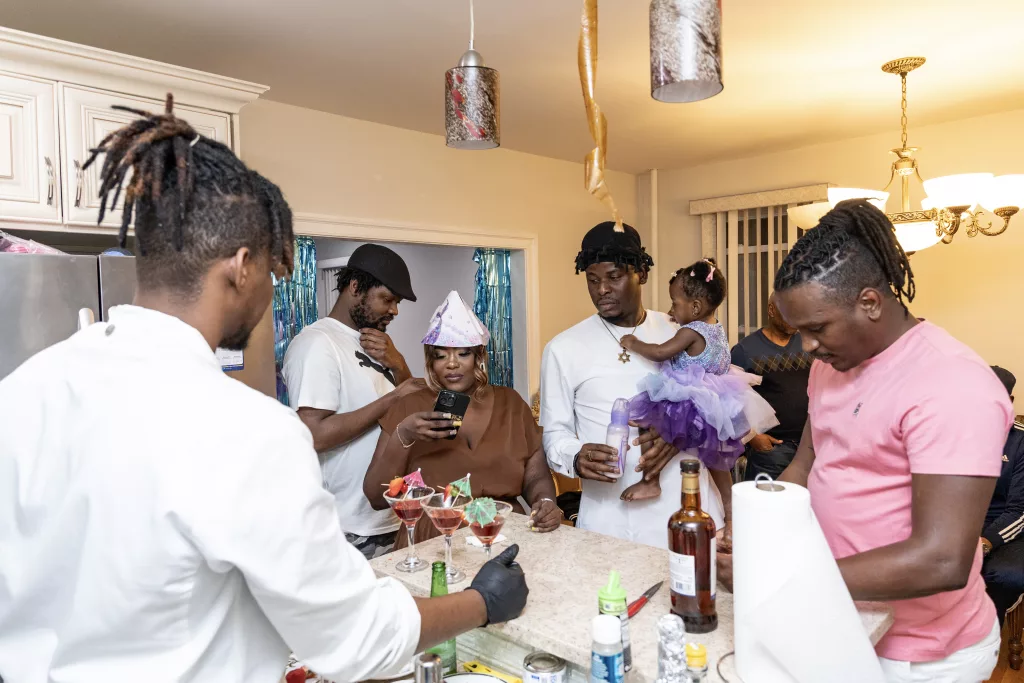
While uncertain about his future, Pierre aspires to open a restaurant and become a renowned chef. He is currently focused on mastering English and finding a way to enroll in the Escoffier School of Culinary Arts.
Early this month, the five officers gathered in the Flatlands neighborhood in Brooklyn, to celebrate the birthday of Roodolph Nicolas’ daughter Alia and his partner Johanne Annee, who share the same birthday.
When they gathered for the birthday party, they began to discuss the recent deployment of the multinational security mission. The former officers stay connected through WhatsApp and occasionally organize impromptu gatherings.
While they appreciated the support and equipment provided to the police, they were all skeptical about the potential outcomes.
“There’s an industry generating gangsters in permanence,” said Pierre. “For each one eliminated, numerous others seem to surface.”
To which Nicolas replied: “The security mission can have a cosmetic impact, giving Haitians the illusion that the country is safe. And as soon as they leave, reality will catch up with us. I have never seen an international mission go after those who fuel the gangs.”
Surrounded by family members, friends, and birthday decorations with purple and blue balloons, Pierre, now a cook, proudly displayed his new gun: a kitchen blow torch. “It has the shape and a trigger,” he said, holding the object in the air. “It does not shoot bullets, but a fire only to feed people.”
